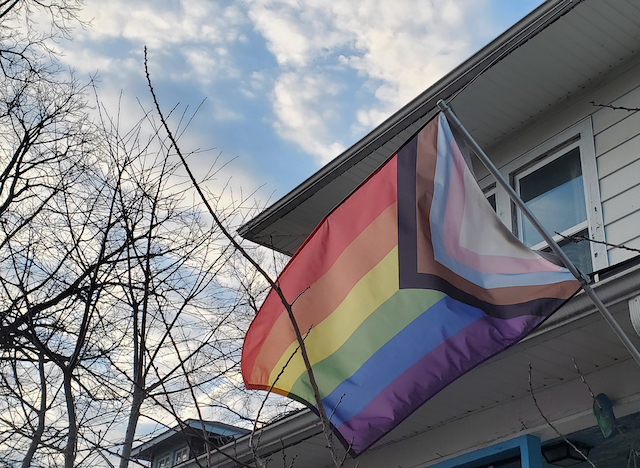U of I researcher studies dating app racism

A house displays an LGBTQ pride flag in residential Urbana on March 5. Research at the University of Illinois has shown that different types of racist interactions on dating apps have varied effects on Black gay men’s mental health. Owen Henderson
URBANA — Racist objectification on gay dating apps harms the mental health of the young Black men who use those apps, according to research from the University of Illinois.
Assistant Professor of Social Work Ryan Wade conducted the studies behind these findings. His work focused on the psychological effects of racist behavior in dating apps on queer Black men.
He said he named the type of behavior he found: Racialized Sexual Discrimination, known as RSD.
RSD is a type of sexual racism, which is a term for the way whiteness and Euro-centric features are valued above non-white racial and ethnic characteristics, Wade said.
“RSD essentially aims to measure the various manifestations of sexual racism that occur in an online dating context among men of color,” he said.
Wade’s research identified several types of RSD that dating app users encountered, he said, but three stuck out as being the most damaging to mental health: white superiority, same-race rejection, and white physical objectification.
White superiority is the elevating of whiteness as the most desirable characteristic in a partner, according to the study “A Good App Is Hard to Find: Examining Differences in Racialized Sexual Discrimination across Online Intimate Partner-Seeking Venues” by Wade and fellow researcher Matthew Pear.
One example of white superiority could be profiles expressing the desire to only be with white men, Wade said.
This type of RSD was associated with higher self-reported depressive symptoms, Wade said, as was being rejected by members of the subject’s own racial and ethnic group in favor of white men.
However, Wade said his research found that white physical objectification had the biggest effect.
This type of RSD is characterized by assumptions about men’s bodies and sexual preferences based on stereotypes about different racial and ethnic groups, according to the study.
“That was the particular manifestation of RSD that was the most impactful,” Wade said. “It seems to be having the most negative effect, being the only manifestation of RSD that had an impact on depressive symptoms and self-worth.”
Wade said their research found that the effects of RSD can be mitigated by a person’s own strong sense of self in their racial or ethnic identity, but he said it wasn’t always so simple.
“Ethnic identity commitment, at least according to the theory we were operating from, is thought to be protective in the context of race-related stress,” Wade said. “It was very interesting because we found evidence to support that, and we found contradictory evidence.”
In the case of same-race rejection, strong ethnic identity was associated with worse mental health outcomes, according to Wade and Pear’s other study, “Online Dating and Mental Health among Young Sexual Minority Black Men: Is Ethnic Identity Protective in the Face of Sexual Racism?”.
Wade acknowledged that these findings might seem intuitive, but he said studies like these are still very necessary because of the lack of work done in this area of research.
“I’m a health researcher, predominantly, and a racial and ethnic health disparities researcher, specifically,” Wade said. “My work has been really situated at the intersection of race and sexual orientation.
“And at that intersection, with respect to Black men, the vast majority of research is all wholly concentrated on HIV, to the neglect of a whole slew of other critical health domains. My broad program of research aims to fill in those gaps.”
Now that more work is being done in this field, Wade said he thinks some of the next steps will be to intervene and stop RSD from taking place.
He suggested that researchers might work with existing dating apps to prevent RSD from occurring on their platforms or even create new apps with an “anti-racist framework built-in.”
An awareness campaign might be helpful in disrupting RSD, Wade said.
“I think about the It Gets Better campaign and The Trevor Project and the way that these initiatives have been leveraged to combat LGBTQ bullying,” he said. “I could imagine a similar campaign around RSD.
“There’s a lot of different directions we could go.”

